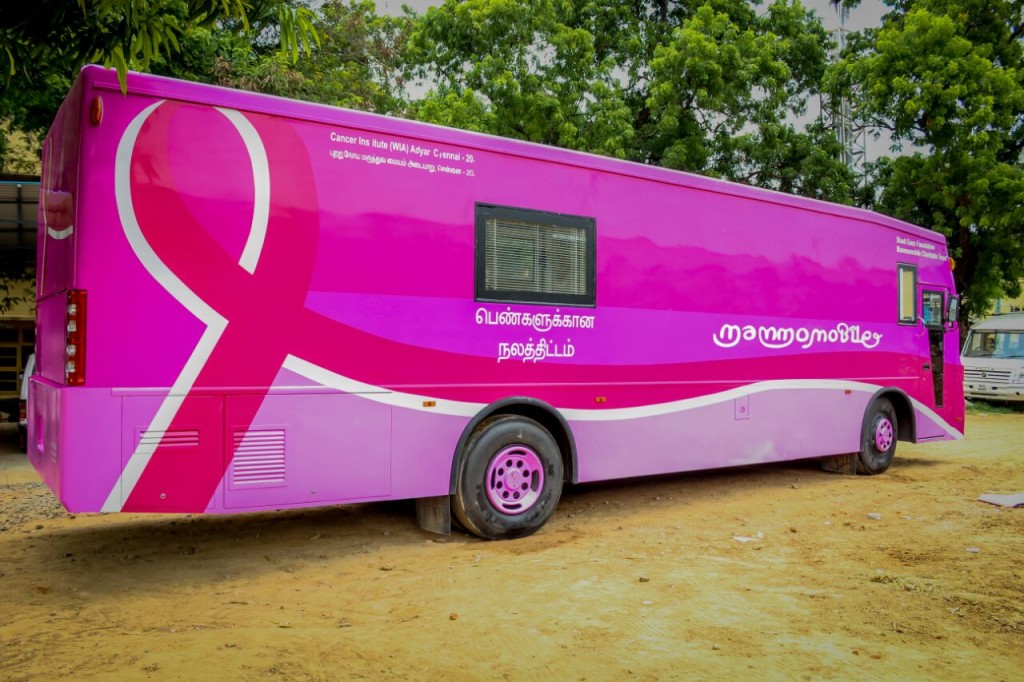Our Project
Over 68% of India’s population lives in rural areas, including hundreds of million women. Each area of around 5,000 inhabitants are allocated a female Village Health Nurse (VHN), who is responsible for disseminating and providing basic health services and information. But the numbers are unmanageable and even if diagnosed, the effective treatment of cancer is limited by social factors.
Women in whom cancer is detected by VHNs, even at a late stage, often have no voice in the matter and the decision to get a mammography check-up and treatment would be taken by their husbands and mother-in-law. Many husbands are agricultural labourers and they do not understand why their wives need to come to town for an examination and to stay away from work, when they appeared fine on the outside and are able to walk.
Most cancer patients therefore arrive in the city hospitals in an incurably advanced state of their disease. As seen in the video, nothing much except pain relief can be offered at that point.
Facts
By 2020, it is predicted in various studies that one fifth of the world’s cancer cases will be found in India[1].
Cervical and breast cancer are the most common cause of cancer deaths among women in India, but early detection and proper treatment can improve this prognosis and can make cancer curable.
The chances of women surviving first or second stage breast and many other cancers are very bright, if a diagnosis can be made in time. The female population in rural areas should have a free annual screening by mobile mammography and ultra sound.
What we are working for
The first pilot project, custom-built Mammomobile screening bus is called Vanakkam Amma (“Welcome Mother” in Tamil), and is modelled on similar programmes in other parts of India and in the West. It is screening women in a safe and comfortable environment throughout Tamil Nadu for the most common types of cancer, such as breast, cervical and oral cancers.
Digital mammography and ultrasound are the basic tools of the van, but in risky cases biopsies can provide for more clarity.
Cervical examination can in most cases diagnose malignant cancer cells, that can be removed in the Screening Bus under local anaesthetic via the so-called LEEP (loop electrosurgical excision procedure) technique.

Our first pilot project with WIA Cancer Institute in Chennai
By 2018, the Mammomobile project has screened more than 20,000 women in 92 villages in Tamil Nadu over a period of two years.
Up to 500 Mammograms per month have been provided free of cost to women.
At the Diamond Jubilee of Chennai’s Adyar Cancer Institute in 2018 and three years of Mammomobile India operations, with the Hon Prime Minister of India Narendra Modi, legendary Dr Shanta addressed Mammomobile and its role in Adyar’s fight against cancer: “We cannot be adequately thankful to you for your donation of the Mammomobile, which is functioning very well. I am happy to tell that we have also been able to get support for the maintenance.”
In collaboration with the WIA Cancer Institute in Chennai and their valuable Outreach Programme and assistance, and in cooperation with leading mammography and automobile manufacturers, artists and art lovers are raising funds through exhibitions and benefit events, and collaborate with private persons, companies, national and international women’s clubs and other NGOs to supplement private family funding of the project
The WIA Cancer Institute operates since 1955 as a charitable organisation that provides world class medical staff, doctors, nurses, pathologists and facilities to cancer patients.
The Institute helps 120,000 patients every year and over 90% come from villages, also from out of state.
We are currently working on our vision for a second bus.
Use of funds
The equipment for the first Mammomobile operating in Tamil Nadu with WIA includes screening apparatus for cancers of the breast, cervix, lung, and mouth with sophisticated technology such as digital mammography, 3D ultra-sound screening and simpler methods such as pap smears, as well as treatment methods such as LEEP.
Our contributions have paid for a pathologist and a technical assistant, who will train the other doctors in the Cancer Institute.
The Cancer Institute in Chennai has supplied a driver for the Mammo Mobile.
The Mammomobile Charitable Trust will monitor the program and every donor can visit the Mammomobile on its long path and action throughout India.



